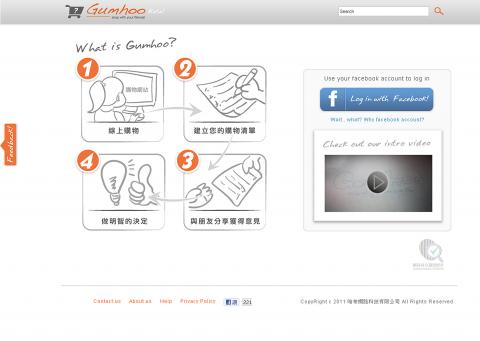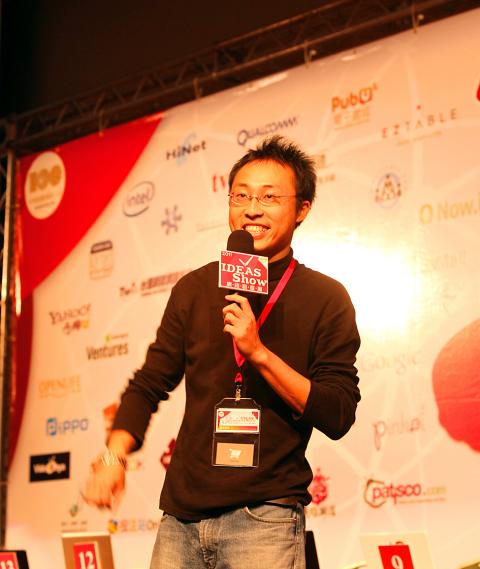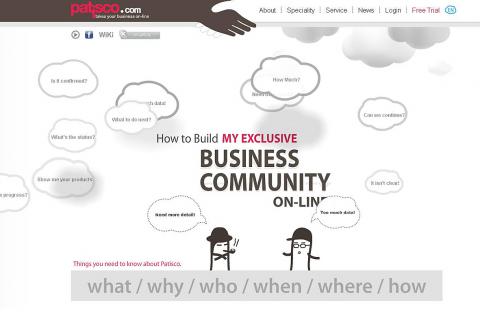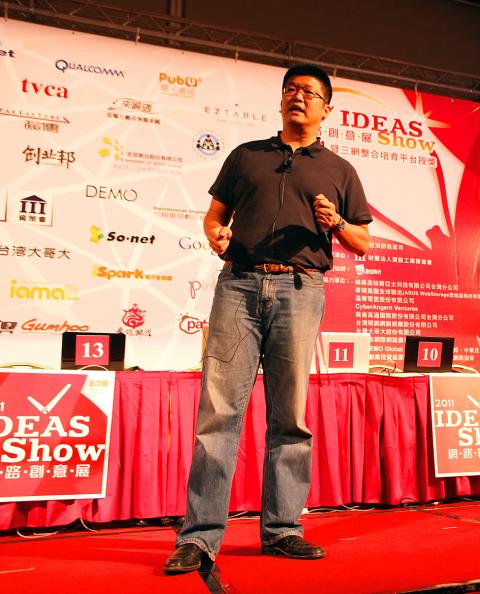Two start-ups, social shopping site Gumhoo and business-to-business platform Patisco, lent a Taiwanese presence to DEMO Fall, which took place earlier this week in Santa Clara, California. The biannual event, one of the top launchpads for emerging technology, is based in Silicon Valley. Previous participants from this country have included Atlaspost (地圖日記), which was purchased by Groupon in December. Gumhoo and Patisco were the first Taiwanese start-ups to present at the show since fall 2009. While neither won any prizes, Gumhoo caught the eye of Intel Capital, Intel Corporation’s investment arm, and Procter and Gamble has expressed an interest in using Patisco, says James Hill, an associate planner with III, of the Institute for Information Industry (III, 財團法人資訊工業策進會) IDEAS Institute, the Web start-up incubator that nominated both companies for the event. For more information about Gumhoo and Patisco, read on.
Gumhoo: Window-shopPING the Internet
Founder Taiku “TK” Chen (陳泰谷) envisions Gumhoo as a “universal shopping cart” that will give users a quick, easy way to reach out to friends for straightforward feedback about items.

Photo: Taipei Times and courtesy of Institute for Information Industry
The inspiration for Gumhoo (the name is a play on the Hoklo (commonly known as Taiwanese) for “is it good?”) came to Chen when he stumbled upon a jacket while out shopping.
“It was on sale and I wanted to buy it, but I couldn’t make a decision,” he says. “I thought sending a text message, e-mail or sharing it on Facebook were all too bothersome. There wasn’t a quick service.”
After logging onto the Web site with their Facebook accounts, users can install a button onto their Web site browser’s bookmark bar to use while browsing online stores. Gumhoo also has an iPhone app that allows users to take a quick snapshot of desired products in stores. Users are given the option of creating private or public lists with their items. Friends can give their opinion by hitting two buttons — “get it” or “hold.”

Photo: Taipei Times and courtesy of Institute for Information Industry
Gumhoo is still in its infancy — it went live in June and has about 400 users — but Chen has big plans for the Web site, which he hopes will hit 5,000 users by the end of this year. The Web site is currently funded by one angel investor (Chen’s father) but the company plans to start raising seed money after DEMO Fall.
In addition to the Taiwanese market, Chen wants to expand Gumhoo to the US, where he studied for two years. There, Gumhoo will compete against social shopping sites like Kaboodle (www.kaboodle.com) and Amazon.com’s wish lists.
Chen says that Gumhoo stands out because of its ease of use and privacy controls. He and his four-member team are currently deliberating adding functions like pricing comparison, a drag-and-drop interface to organize lists and a barcode scanner for smartphones.

Photo: Taipei Times and courtesy of Institute for Information Industry
“Our goal is to make a product that really helps people connect with friends while shopping and has the tools to help them make purchasing decisions,” says Chen.
Chen envisions users sharing their lists with small groups of about three to five friends. The Web site’s target demographic is women in their 20s to 40s, but Gumhoo also markets itself as a tool for families organizing their grocery lists, couples creating a wedding registry or friends looking for supplies while party planning.
The Gumhoo team hopes to develop partnerships with e-commerce sites like PayEasy (www.payeasy.com.tw) and Fashion Guide (www.fashionguide.com.tw). Online stores can embed a Gumhoo button onto their Web sites in exchange for demographic data and analytics that show which items are “Gumhooed” the most and how users vote on them. (Chen says the information will only be made available from lists users choose to make public).

Photo: Taipei Times and courtesy of Institute for Information Industry
For more information, visit www.gumhoo.com
Patisco: Connecting suppliers and their customers
Patisco is a cloud-based business-to-business platform that seeks to make life easier for suppliers, middlemen and clients.
Founder Even Chung (鍾亦恒) created Patisco after 15 years working for his family’s company, which sells bicycle parts to clients in Europe and Japan. Chung also spent seven years exporting textiles, consumer electronic components and GPS navigation systems.
Chung says all his trading experience has given him plenty of opportunities to see how things can go wrong. For example, he says a tiny omission in an e-mail sent by an assistant once cost him a chunk of revenue.
“My office lady thought she didn’t have to describe one detail of a component. She skipped just one line, but that one line cost me NT$500,000,” says Chung.
“I’ve realized that the essence of trading is pretty much the same: good communication, good relationships and good vision,” he adds.
Chung, who has spent four years developing Patisco and invested NT$10 million in the start-up, says its aim is to offer an alternative to e-mail by streamlining information and communication management. He hopes those features will help it compete against China-based Alibaba (www.alibaba.com), which focuses on keyword searches and advertisements.
“I was a heavy user of Alibaba and it was very troublesome for me. I put products on it and every day I would receive 20 to 30 inquiries from around the world,” says Chung.
Sending production and pricing information via individual e-mails was “time consuming and not productive,” he adds.
Patisco’s user interface allows suppliers and their customers to view several streams of information at once, including all correspondence related to an order, prototype sketches and product specifications. Companies can create comparison charts for items from different suppliers, ask for adjustments and negotiate prices. Supervisors are given the option of signing off on messages before they are sent. All data related to an order or project is automatically organized into files for archiving.
Patisco currently has about 270 companies using the platform on a trial basis. Though about half of those businesses are based in China, Chung envisions Patisco first expanding with paid licensees in Taiwan before moving on to English-speaking countries.
“A lot of people see us as a supply chain management platform, while suppliers see us as CRM [customer relationship management],” says Chung of Patisco’s software, which is patented in Taiwan. “But so far I haven’t really seen anyone putting the two things together and trying to make a harmonic connection between them.”
For more information, visit www.patisco.com

Jacques Poissant’s suffering stopped the day he asked his daughter if it would be “cowardly to ask to be helped to die.” The retired Canadian insurance adviser was 93, and “was wasting away” after a long battle with prostate cancer. “He no longer had any zest for life,” Josee Poissant said. Last year her mother made the same choice at 96 when she realized she would not be getting out of hospital. She died surrounded by her children and their partners listening to the music she loved. “She was at peace. She sang until she went to sleep.” Josee Poissant remembers it as a beautiful

Before the last section of the round-the-island railway was electrified, one old blue train still chugged back and forth between Pingtung County’s Fangliao (枋寮) and Taitung (台東) stations once a day. It was so slow, was so hot (it had no air conditioning) and covered such a short distance, that the low fare still failed to attract many riders. This relic of the past was finally retired when the South Link Line was fully electrified on Dec. 23, 2020. A wave of nostalgia surrounded the termination of the Ordinary Train service, as these train carriages had been in use for decades

Lori Sepich smoked for years and sometimes skipped taking her blood pressure medicine. But she never thought she’d have a heart attack. The possibility “just wasn’t registering with me,” said the 64-year-old from Memphis, Tennessee, who suffered two of them 13 years apart. She’s far from alone. More than 60 million women in the US live with cardiovascular disease, which includes heart disease as well as stroke, heart failure and atrial fibrillation. And despite the myth that heart attacks mostly strike men, women are vulnerable too. Overall in the US, 1 in 5 women dies of cardiovascular disease each year, 37,000 of them

March 2 to March 8 Gunfire rang out along the shore of the frontline island of Lieyu (烈嶼) on a foggy afternoon on March 7, 1987. By the time it was over, about 20 unarmed Vietnamese refugees — men, women, elderly and children — were dead. They were hastily buried, followed by decades of silence. Months later, opposition politicians and journalists tried to uncover what had happened, but conflicting accounts only deepened the confusion. One version suggested that government troops had mistakenly killed their own operatives attempting to return home from Vietnam. The military maintained that the